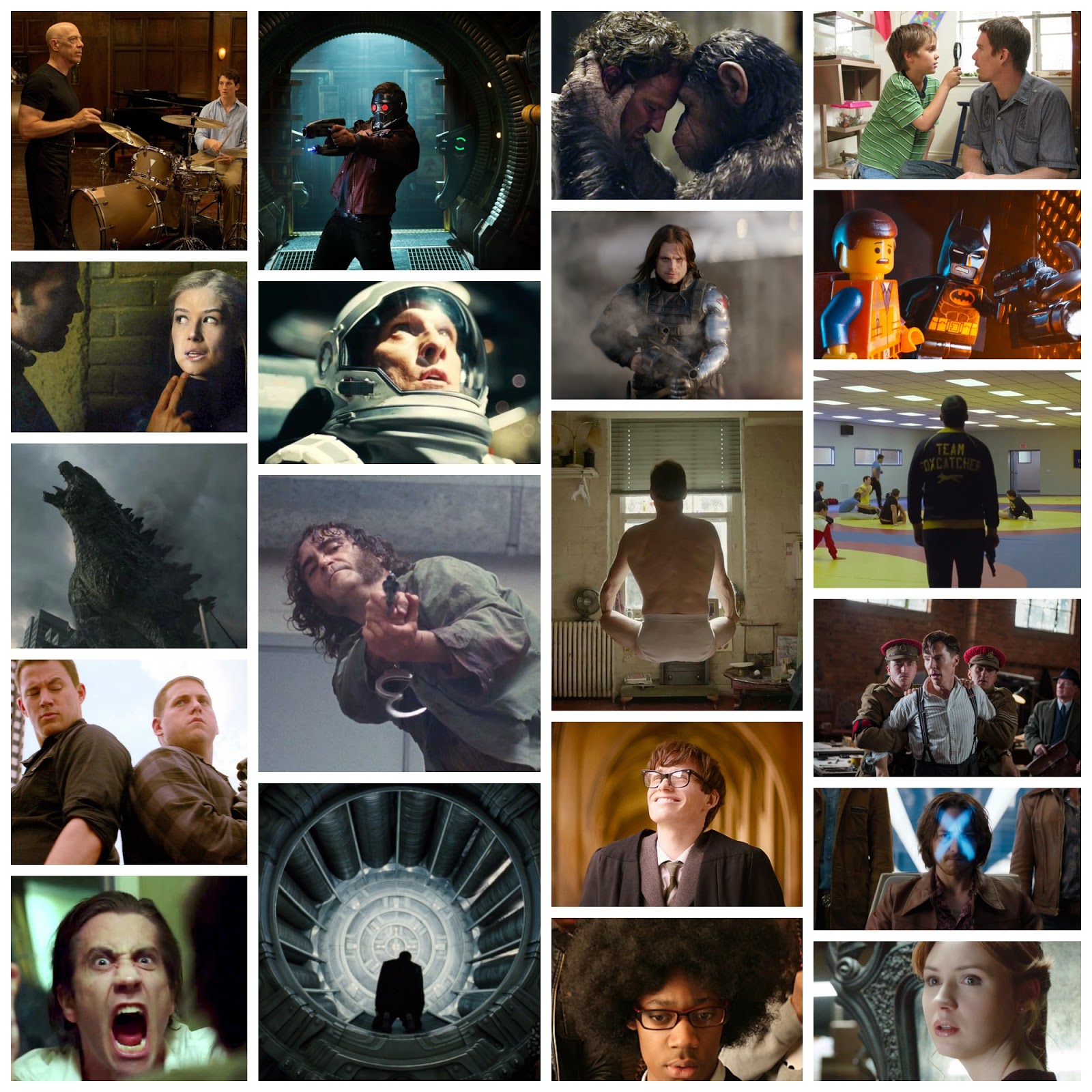With so many incredible movies released in 2014, this year's film ranking may have been the toughest one yet. Out of the 176 first time views this year, 58 were new releases (you can view a full ranking of every 2014 release I watched this year here: http://letterboxd.com/richard_newby/list/2014-film-ranking/). In any other year the films that ranked 11-20 would have definitely made it to the top of my list, so my top 10 are the ones I thought were really something special.
Top 10 (originally published at http://www.audienceseverywhere.net/):
1. Whiplash
When I first bought a ticket for Whiplash, little did
I expect I would be watching the tensest movie of the year. To put things in
perspective: I usually don’t sit through the credits, but the film was such a
punch in the gut that I couldn’t move until after the house lights came up.
2. Guardians of the Galaxy
Guardians is the most fun I had at a movie theater all
year, and it’s clear that everything from its performances, direction, and
awesome mix are done with love. As a lifelong comics fan, I can attest that
James Gunn celebrated the weirdness of the Marvel Universe, and introduced
characters I never through I’d see on the big screen.
3. Dawn of the Planet of the Apes
A Shakespearian drama by way of apes, Dawn brought
allegorical gravity to the summer movie season. Andy Serkis is a cinematic
treasure and if anyone still had any doubts that motion capture could stand
with regular performances, this movie should clear that right up.
4. Boyhood
Linklater’s magnum opus takes full advantage of the
capabilities of film, continuing the philosophical themes and experimentation
with time that made many of his previous films so remarkable. Boyhood is one of
the best coming of age movies, one that works with just as much intelligence as
it does heart.
5. Gone Girl
David Fincher dangles his audience on a string,
swinging us from scenes of caustic, honest humor to those of shocking horror.
With Amy Elliot Dunne, Fincher and Flynn create one of the year’s most
memorable and complex characters.
6. Interstellar
With Interstellar, Christopher Nolan creates a
thrilling science-fiction film whose answers you have to work for. The film
undoubtedly has its flaws, but when so many films play it safe it is undeniably
exciting to see a director aim so high with his ambition.
7. Captain America: The Winter Soldier
The Russos, who had ironically been my last pick on
the shortlist of Cap 2 directors, delivered one of the best and most
politically relevant comic based films of the decade. Winter Soldier doesn’t
just operate under 2001 notions of terrorism, but looks at the world today while offering all the excitement and
humor we’ve come to expect from Marvel Studios.
8. The Lego Movie
There hasn’t been a satire of genre movies this smart
and fun since Mel Brooks rode in with Blazing Saddles. The Lego Movie was an
unexpected surprise, an exercise in wit that’s more than just an animated kids’
movie.
9. Godzilla
Godzilla relies on atmosphere more than action scenes,
and instead of wearing the audience out with battle fatigue, Gareth Edwards
ensures the climax is worth the weight. In its focus on family and an impending
sense of doom, Godzilla is reminiscent of blockbusters from the 70s and 80s
while remaining modern in its examination of man’s arrogance.
10. Inherent Vice
Paul Thomas Anderson’s 70s set neo-noir eschews modern
plot sensibilities, yet still manages to craft complex characters that are
parodic yet honest. It’s one of the year’s funniest films, and one that I had
to learn how to watch, in order to fully appreciate it.
Honorable
Mentions: Birdman (or The
Unexpected Virtue of Ignorance), Foxcatcher, 22 Jump Street, Nightcrawler, Snowpiercer, The Theory of
Everything, The Imitation Game, Dear White People, X-Men: Days of Future Past, Oculus
Worst of the Year: Sabotage, Pompeii, Hercules, Jack Ryan: Shadow Recruit
2015’s Most Anticipated:
1. Star Wars: The Force Awakens
2. Avengers: Age of Ultron
3. Spectre
4. The Hateful Eight
5. Crimson Peak
6. Trainwreck
7. The Revenant
8. Inside Out
9. Ant-Man
10. That's What I'm Talking About
11. Knight of Cups
12. Jurassic World
13. Friday the 13th
11. Knight of Cups
12. Jurassic World
13. Friday the 13th
Lastly, I'd like to thank everyone who visited my blog
this year and read my reviews. This first year has been quite exciting and I
owe a lot to this blog and to those of you who have supported it in various
ways. Your opinions are immensely valuable to me, and the feedback I've received
has helped me to become a better writer and viewer. Looking forward to great things in
2015!
--Richard Newby










.jpg)

